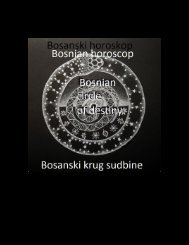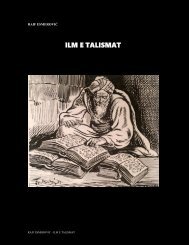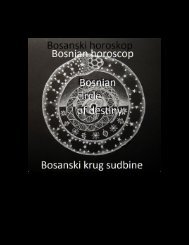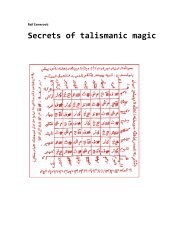Cult of fertility among the Bosnian People
In order to write credibly and in detail about the cult of fertility of the Bosnian people, it is necessary to start from the beginning which goes back to the ancient times and speaks about our famous forefathers the Illyrians, and one of their most important deities - snake. Namely, Illyrian cult of the snake as a primary symbol of fertility in folk religion of the Bosnian people, is not only noticeable in the belief about the home snake - protector of the family, i.e. totem of the head of the family, usually a male, i.e. father, but also her sacred meaning. The snake cult, on which the genesis of the grandfather of our forefathers is based on, has an even wider meaning and significance.
In order to write credibly and in detail about the cult of fertility of the Bosnian people, it is necessary to start from the beginning which goes back to the ancient times and speaks about our famous forefathers the Illyrians, and one of their most important deities - snake. Namely, Illyrian cult of the snake as a primary symbol of fertility in folk religion of the Bosnian people, is not only noticeable in the belief about the home snake - protector of the family, i.e. totem of the head of the family, usually a male, i.e. father, but also her sacred meaning. The snake cult, on which the genesis of the grandfather of our forefathers is based on, has an even wider meaning and significance.
- TAGS
- raif-esmerovic
You also want an ePaper? Increase the reach of your titles
YUMPU automatically turns print PDFs into web optimized ePapers that Google loves.
tradition spread throughout many<br />
parts <strong>of</strong> <strong>the</strong> world it is<br />
interesting that in <strong>the</strong> past it<br />
<strong>of</strong>ten originated during difficult<br />
living conditions, or as a<br />
consequence <strong>of</strong> war, when a man had<br />
to take care <strong>of</strong> a few women and<br />
children that came about from such<br />
relationships. Deficit <strong>of</strong> male<br />
population in a certain area or<br />
region was a key issue in <strong>the</strong> area<br />
<strong>of</strong> northwest Bosnia, where <strong>the</strong><br />
border between Islam and<br />
Christianity lasted <strong>the</strong> longest.<br />
With <strong>the</strong> death <strong>of</strong> a large number<br />
<strong>of</strong> adult males <strong>the</strong>re was<br />
unquestionably a decline <strong>of</strong><br />
population and polygamy should be<br />
analysed using this data as a<br />
social phenomenon which is not<br />
close to <strong>the</strong> wider European<br />
tradition. Due to tragic<br />
historical events, after <strong>the</strong> fall<br />
<strong>of</strong> Ottoman empire, especially WWI<br />
and WWII <strong>the</strong> need for polygamy was<br />
continued and its advent was<br />
recorded up until <strong>the</strong> middle <strong>of</strong><br />
<strong>the</strong> twentieth century.<br />
women in Cazin krajina (border) in<br />
<strong>the</strong> 19th and 20th century.<br />
He beats her in certain moments<br />
when he should be extremely kind<br />
and gentle towards her. One man<br />
beat his wife while she was lying<br />
sick in bed (29/49), and ano<strong>the</strong>r<br />
person, seven days after birth<br />
(119/48). This is what is stated<br />
in one appeal: "He tortured me in<br />
various ways, locked me all day<br />
inside <strong>the</strong> house without food, and<br />
when he arrived, he would beat me<br />
with a rubber until I would<br />
faint." (8/48) There were cases<br />
where husbands would rip out <strong>the</strong>ir<br />
wife's hair when angry (Velika<br />
Kladuša, 110/49). One cannot<br />
believe <strong>the</strong> ways in which husbands<br />
torture <strong>the</strong>ir wives. There was one<br />
person that beat his wife, tied<br />
her hands, and when in bed he<br />
would stand on her hands and he<br />
would slap her in <strong>the</strong> face. After<br />
that he would throw her out <strong>of</strong> <strong>the</strong><br />
house barefoot into <strong>the</strong> snow<br />
(Velika Kladuša, 95/51).(3)<br />
Balkan and primitivism<br />
We can also read in <strong>the</strong> yearbook<br />
various court confessions <strong>of</strong> women<br />
who were targets <strong>of</strong> physical and<br />
mental abuse by <strong>the</strong>ir husbands,<br />
which is best presented by an<br />
extremely difficult position <strong>of</strong><br />
Raif Esmerović<br />
10<br />
Of course, we should stress that<br />
<strong>the</strong> phenomenon <strong>of</strong> torturing women<br />
is not only characteristic for BiH<br />
but for <strong>the</strong> entire Balkans where<br />
<strong>the</strong> social trend <strong>of</strong> marginalizing<br />
women was pronounced for ages,<br />
this was deeply intertwined with<br />
physical and mental torture, which<br />
<strong>of</strong>ten ended in murders. It is<br />
unthinkable that today, in <strong>the</strong><br />
<strong>Cult</strong> <strong>of</strong> <strong>fertility</strong> <strong>among</strong> <strong>the</strong> <strong>Bosnian</strong> <strong>People</strong>

















